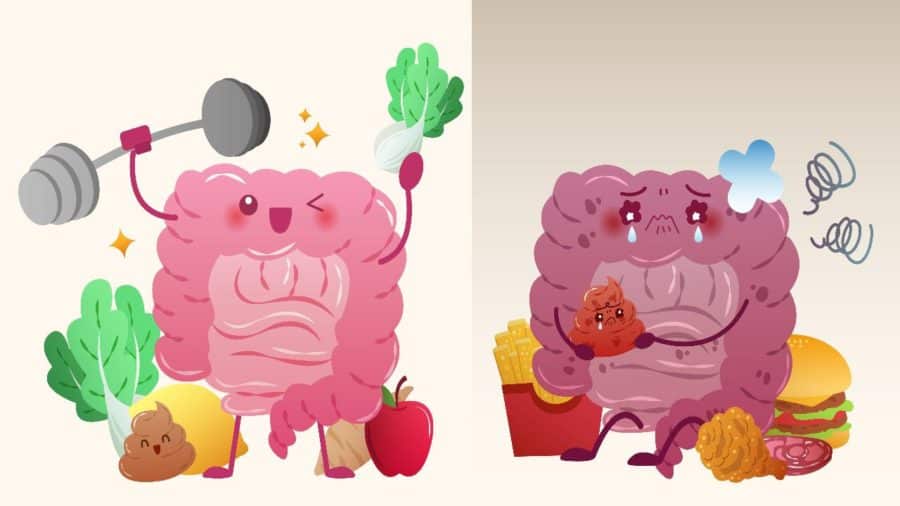Recently, there are already many forms of diet and exercise that promote one’s overall health. Although having a good physique and mental health is crucial, it’s important to understand that the state of the human gut, specifically the bacteria living inside the body, is also a deciding factor when it comes to one’s mental and physical health.
That being said, here’s a basic guide to understanding the human gut microbiome.
What Is the Gut Microbiome?
The human gut has trillions of bacteria, fungi, and viruses collectively known as the microbiome.
Usually, when people hear of bacteria, fungi, and viruses, they often associate these with diseases. However, these tiny organisms also have a major effect on an individual’s overall health, such as the immune system, cardiovascular health, weight, gastrointestinal disorders, and more.
For instance, studies have shown that the gut microbiome may affect the heart’s health. This is because certain unhealthy species residing in the gut may contribute to heart disease by generating the chemical trimethylamine N-oxide (TMAO), which is a factor that contributes to blocked arteries, leading to stroke or heart attacks.
This is why it’s important to be updated on the state of one’s own gut microbiome. Fortunately, there are microbiome testing kits, such as My Psomagen, that informs you about the diversity of your gut microbiome.
Factors That Affect The Gut Microbiome
The gut’s microbiome can be affected by several intrinsic and extrinsic factors. These factors will determine the composition of the bacteria in one’s gut, ultimately affecting one’s health.
Here are some of those factors:
- Method of delivery during birth: Studies have shown that infants born via cesarean section have a different gut bacterial composition compared to those born via vaginal delivery.
The reason for this is that infants born via vaginal delivery are already exposed to the mother’s bacteria during birth. This will influence the infant’s gut bacteria. In addition, it may also stimulate white blood cells and other important components of the infant’s immune system.
- Genetics: The quantity of the bacteria found in one’s gut is also influenced by the host’s genetic makeup. In fact, related individuals have similar microbiota compared to unrelated ones. Microbiota refers to the ecological community of microorganisms found in all multi-cellular organisms.
- Antibiotics: In addition to being one of the most commonly prescribed drugs, antibiotics can also affect the gut microbiome, which is sometimes rapid and persistent. For example, a study shows that broad-spectrum antibiotics, such as Doxycycline and Amoxicillin, can increase the number of bacteria that could be beneficial for pathogens while reducing the number of beneficial bacteria.
- Diet: There are plenty of studies, conducted in both mice and humans, showing that a diet rich in calories is a huge factor in obesity and Type 2 diabetes.
Furthermore, various pieces of evidence state that there’s a link between these diseases and one’s gut microbiome. That’s why dietary changes, particularly those that promote healthy bacteria, may lessen the chances of becoming obese and developing Type 2 diabetes.
How To Promote Health Gut Bacteria

As shown above, since some diseases are influenced by one’s gut bacteria composition, it’s important to promote the healthy bacteria kind. To do that, it’s important to incorporate probiotics and prebiotics into one’s diet.
Probiotics are microorganisms that provide health benefits, such as weight loss, immune function, and good digestive health. This is done by improving or restoring the health of beneficial gut bacteria.
Since probiotics play an important role in gut bacteria health, it’s important to incorporate a high-quality probiotic supplement in one’s diet because it may be difficult to eat a sufficient amount of probiotic-rich foods daily.
Still, if possible, it’s always best to incorporate foods rich in probiotics in one’s diet, such as:
- Sauerkraut
- Kimchi
- Miso
- Pickles
- Kombucha
- Kefir
- Tempeh
On the other hand, prebiotics are a type of dietary fiber that serves as food for the good bacteria in the gut. As a result, the bacteria could help colon cells by producing required nutrients, leading to a better digestive system.
Prebiotics can be found in:
- Bananas
- Cabbage
- Almonds
- Watermelon
- Garlic
- Onions
Takeaway
Since the gut microbiome plays an important role in human health, like controlling digestion and providing benefits for the immune system, it’s important to maintain or improve its health. This can be done by consuming or incorporating food or supplements rich in both probiotics and prebiotics.
Fortunately, you’ll able to avoid the guesswork concerning the state of your gut and what class of bacteria dominates your microbiome by using testing kits, which are conveniently available online.



